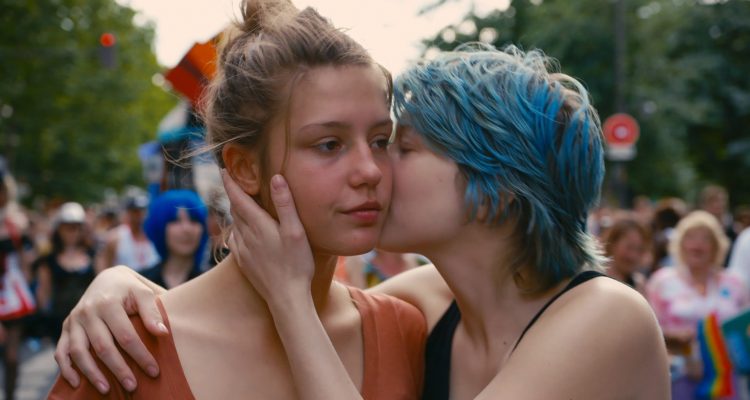On a purely surface level, you can draw comparisons between Céline Sciamma’s recent award-winning Cannes film “Portrait of a Lady on Fire” and the Palme d’Or winning film “Blue is the Warmest Color” from filmmaker Abdellatif Kechiche. Both films, though very different in execution, follow a passionate love story between two women. However, for many film fans, that’s the beginning, middle, and end of the similarities, as Sciamma and Kechiche seemingly approach the subject from two completely different points of view.
The main criticism about Kechiche’s films, particularly ‘Blue’ but also his recent Cannes film “Mektoub, My Love: Intermezzo,” is that the filmmaker tends to portray the love affair between people in an overly sexualized way, due to his inherent “male gaze.” Sciamma, on the other hand, presents what many believe to be a superior view of a love story, as she presents her films from a decidedly female gaze.
But according to Sciamma, viewing the two filmmakers as polar opposites or one better than the other doesn’t do anyone any favors. In fact, she’s a fan of Kechiche and his works, and was completely happy to share this year’s Cannes competition with the filmmaker.
“It was extremely interesting to have both our films in competition,” Sciamma said to So Film magazine (via IndieWire). “Thanks to Kechiche’s film, and to ‘Portrait,’ the French critics were faced with questions of the male and female gaze, and the issues that stem from the act of looking. Kechiche and I make films that act as manifestos about such questions. It is completely stupid to think you can only love one at the expense of the other. To the contrary!”
READ MORE: Céline Sciamma’s ‘Portrait Of A Lady On Fire’ Is A Searing Love Story [Cannes Review]
“Here’s where certain French critics and viewers are not doing enough deconstructive work,” she added. “We can absolutely love both films. We do not live up to the exciting nature of this moment if we start reducing everything to questions of ‘good or not good; moral or immoral; voyeur or not voyeur,’ that’s not the point. The key is to understand what animates such images, and what they seek to impart.”
But what about ‘Blue?’ At the time, the film was heralded as a masterpiece, with people commending the way in which the film presented an LGBTQ love affair. However, in the years since, criticism has followed the film, as the actresses involved shared horror stories about Kechiche and the production. But to Sciamma, she actually enjoys ‘Blue’ and thinks that it’s a great representation of Kechiche’s filmmaking.
She explained, “I like ‘Blue is the Warmest Color,’ for example, and I thought the sex scenes fit perfectly with Kechiche’s larger project: to depict his relationship with his actresses, and their relationship with one another. That’s fascinating, so long as you remain active, which is essential when watching Kechiche’s films. [We should] avoid base judgments and have the courage to question the gaze — our own, and that of the director. But that requires some effort from the spectator.”
Regardless of Sciamma’s opinion, film fans will still debate Kechiche’s films for years to come. That being said, it is interesting to see a filmmaker so respected as Sciamma step up for another creator that seems to be the subject of never-ending controversy, including recent accusations of inappropriate behavior on ‘Intermezzo.’

